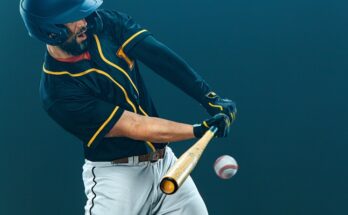LAKE BUENA VISTA, Fla. — Capping the longest season in NBA history with a dominant final flourish, the Los Angeles Lakers won it all for the first time in a decade.
Three-hundred fifty-six days after the season began, the Lakers won the 2019-20 NBA championship.
In a 106-93 closeout Game 6 of the NBA Finals on Sunday night against the Miami Heat, LeBron James logged a triple-double — 28 points, 14 rebounds and 10 assists — to win his fourth Finals MVP award and fourth ring. He has now won championships with three franchises.
Anthony Davis added 19 points and 15 boards Sunday.
It was the third wire-to-wire victory to clinch an NBA title in the past 50 seasons, according to the Elias Sports Bureau, joining the 1982 Lakers and the 1986 Boston Celtics.
After failing to beat the Heat in Friday’s Game 5 — James’ first loss in a closeout opportunity in his Finals career — Lakers coach Frank Vogel changed the starting lineup, moving Davis to the 5 and plugging Alex Caruso in Dwight Howard‘s place for a smaller, quicker group.
The move seemed to give L.A. a boost: It led 28-20 after the first quarter and by as many as 30 in the first half. It outscored Miami 36-16 in the second quarter.
L.A.’s 28-point halftime lead was the second largest in NBA history — just below the 30-point lead the Celtics had on the Lakers in Game 1 of the 1985 Finals. In other words: Memorial Day Massacre, meet the Bubble Bloodbath.
Jimmy Butler, Miami’s fearless leader who pushed L.A. with a 40-point triple-double in a Game 3 win for the Heat and a 35-point triple-double in a Game 5 win, was finally contained, finishing with 12 points Sunday.
“We have a Ph.D. in adversity, I can tell you that much,” Vogel said. “We’ve been through a lot, but I’m so damn proud of this team. World champions!”
This is the Lakers’ 17th NBA championship, which ties the franchise with the Celtics, who most recently won a title in 2008 by defeating a Kobe Bryant-led Los Angeles team, for the most in league history. The Lakers most recently raised the Larry O’Brien Trophy in 2010, when they beat Boston, with Bryant winning Finals MVP.
This championship was historic in many respects. The Lakers became the first team in league history to go undefeated when taking a lead into the fourth quarter, going 57-0 between the regular season and the playoffs. They were also the first franchise to earn the No. 1 seed following a five-year postseason absence.
L.A. also endured the unprecedented scenario of a restart in an NBA bubble at Walt Disney World Resort to conclude a season stopped by the COVID-19 pandemic. Los Angeles spent 95 days in the bubble, going 3-5 in the tune-up and seeding games before defeating the Portland Trail Blazers, Houston Rockets and Denver Nuggets in five games each and the Heat in six.
The first-round matchup with the Trail Blazers highlighted the complexities of navigating a title run as social unrest over police brutality pulsed through the country. Many players joined peaceful protests after the killing of George Floyd on May 25, and they took more drastic measures following the Aug. 23 shooting of Jacob Blake, a 29-year-old Black man, by police in Kenosha, Wisconsin.
The Milwaukee Bucks initiated an impromptu protest that resulted in the postponement of the postseason’s first round for three days as players sought to reconcile how to enact more social change. James was part of a small group of players to consult with former president Barack Obama on how to move forward and make the work stoppage meaningful. The NBA made the decision to display “Black Lives Matter” at half court when the courts were constructed in July.
“Congrats to the @Lakers and @Seattlestorm on their championship wins!” Obama tweeted Sunday night. “Proud of all the NBA and WNBA teams and players who’ve been using their platforms to take a stand for racial justice and encourage civic participation this season.”
Turmoil was a trend for the Lakers all season. It started when a preseason trip to China was rife with tension after Rockets general manager Daryl Morey’s tweet in support of Hong Kong protesters almost led to the cancellation of the exhibition games that L.A. flew halfway around the world to play.
In January, the team was in New York for former NBA commissioner David Stern’s memorial service at Radio City Music Hall. Later that month, the franchise mourned along with the global basketball community after Bryant and his daughter Gianna were among nine peopled killed in a helicopter crash in Calabasas, California.
The Lakers carried Bryant’s memory with them the rest of the season, ending huddles with “1-2-3, Mamba!” and breaking out special Black Mamba uniforms in the playoffs. They wore the jerseys five times in the postseason and went 4-1, including Game 2 of the Western Conference finals, when Davis hit the game-winning shot at the buzzer and exclaimed “Kobe!” after the ball fell through the net.
“Go Lakers! Congratulations Uncle P! Congratulations @lakers. Kobe was right, RP! “Stay the course – blockout the noise.” Wish Kobe and Gigi were here to see this,” Vanessa Bryant wrote, accompanied by a photo of Kobe and general manager Rob Pelinka, in an Instagram story after the Lakers won the title.
“I think Kobe and Gianna have guided this team the entire year,” Pelinka said. “Kobe’s voice is in my head. Always. Every day. Every minute. And I think to be able to — for LeBron and AD and Vogel and myself and Jeanie [Buss], for us to be able to win this championship doesn’t take away the sting of the loss. But it helps us add to their legacy. Their legacy will last forever. It will impact lives around the world in positive ways.”
In a purely basketball sense, it was a renaissance season for L.A., with the Lakers finishing third in defensive rating and 11th in offensive rating and amassing only three losing streaks all season. The second season for James and the Lakers could not have been more different than the first, which was a disaster. The Lakers plummeted in the standings after James suffered a slight tear in his left groin on Christmas Day. When he returned for a playoff push — shortly before L.A. was unable to acquire Davis from the New Orleans Pelicans — the wheels fell off the franchise. Then-president of basketball operations Magic Johnson stunned the team by announcing his resignation before the regular-season finale. Not long after, the team parted ways with then-coach Luke Walton.
Slowly, the organization stabilized. On May 13, the Lakers hired Vogel as their coach after Monty Williams backed out of negotiations and an agreement with Tyronn Lue fell apart over money. Pelinka, empowered to run the front office with Johnson gone and no one hired to replace him, executed a trade that landed Davis in exchange for Lonzo Ball, Brandon Ingram, Josh Hart, three first-round picks and a pick swap.
The Lakers made a free-agency run at Kawhi Leonard, who had just won a championship with the Toronto Raptors, but Leonard chose the Lakers’ Staples Center cohabitants, the LA Clippers. Pelinka reconstituted the roster, putting a premium on championship experience and cohesion and fortifying the group with veterans such as Danny Green, Avery Bradley, Quinn Cook and Jared Dudley. The team re-signed Rajon Rondo, JaVale McGee, Caruso and Kentavious Caldwell-Pope so there was some familiarity in the locker room. They Lakers also had a couple of surprise signings — Howard to a non-guaranteed contract after DeMarcus Cousins underwent knee surgery and Markieff Morris off the waiver wire in February — pay off in big ways, as both players ended up starting playoff games.
“Rob Pelinka really made me feel good tonight reaching out after the Lakers won the NBA Championship,” Johnson tweeted. “It means the world to me because I know he’s in the middle of celebrating with all of the Lakers players, coaches, and Jeanie Buss he didn’t have to!”
Despite the dramatic overhaul and their position atop the Western Conference for much of the season, the Lakers were snubbed when it came to individual accolades.
James, after changing positions to point guard in his 17th season and leading the league in assists for the first time in his career as a 35-year-old, came in second in MVP voting. Davis, who was third in the league in blocks and sixth among forwards in steals and anchored the Lakers’ defense that went from 14th in defensive efficiency to third, finished second in Defensive Player of the Year voting. Vogel, who coached the Lakers to the No. 1 record in the West in his first season with the team, finished fifth for Coach of the Year. Pelinka, the man who put the whole thing together, finished seventh for the NBA Executive of the Year Award.
Lakers governor Jeanie Buss, daughter of late Lakers owner Dr. Jerry Buss, watched the game from a plexiglass-encased perch at AdventHealth Arena, on hand for the team’s first championship since her father died and she took over the family business.
“You have written your own inspiring chapter in the great Laker history,” Jeanie Buss said during the trophy presentation. “And to Laker Nation, we have been through a heartbreaking tragedy with the loss of our beloved Kobe Bryant. Let this trophy serve as a reminder of when we come together, believe in each other, incredible things can happen.”
Her team was the last team standing in the bubble, and she’ll have to arrange for another championship banner for Staples Center when the Lakers return home.

